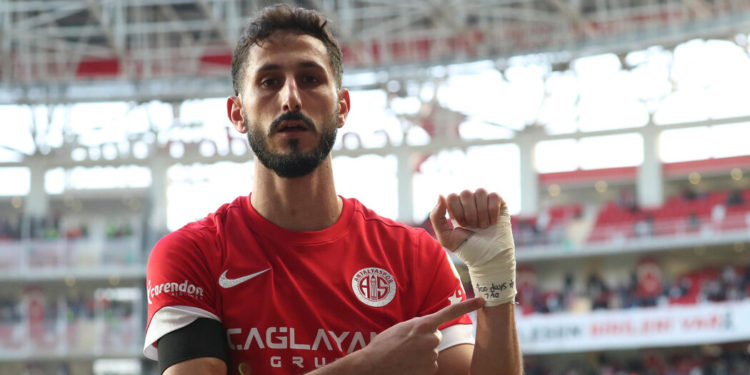By THE NEW YORK TIMES
An Israeli soccer player for a Turkish clug was briefly detained by the Turkish authorities and suspended by the club after he displayed a message of support for Israel during a game on Sunday.
The player, Sagiv Jehezkel, a 28-year-old wing for the top-division club Antalyaspor, flashed the message after he scored in a match.
To celebrate his goal, Mr. Jehezkel jogged to the corner of the field, where a group of photographers was positioned. He pointed to a handwritten message on a band of tape on his left wrist that included a six-pointed Star of David and “100 days, 7/10” — a reference to the start of the war between Israel and Hamas on Oct. 7.
His gesture spread quickly on social media, stirring outrage among fans and even the president of his club, who called his action “propaganda” in a series of posts on X, the site formerly known as Twitter. But it also highlighted the risks that prominent athletes face when sharing their opinions on the war in Gaza, after controversies in France, Germany and South Africa.
Turkish prosecutors detained Mr. Jehezkel after the game, in the club’s home city, the southwestern city of Antalya, for “instigating hatred and enmity among the public.” He was released on Monday, Turkish broadcasters reported, and returned to Israel on Monday night, traveling with his family, according to Israel’s sports and culture minister, Miki Zohar.
Mr. Jehezkel’s statement to prosecutors said his message was a call for the war to end, according to Turkish news media.
On Sunday, the president of Antalyaspor, Sinan Boztepe, said the club’s board had suspended Mr. Jehezkel from the team. In a statement, the club charged that Mr. Jehezkel had “insulted the values of Turkey.” Team officials also said they would seek to terminate the three-year contract Mr. Jehezkel signed when he joined Antalyaspor in September. The Turkish soccer federation also said that it had initiated disciplinary proceedings against him.
Israeli officials responded angrily to his detention, and to a separate incident in which another club in the Turkish league, Basaksehir, began disciplinary proceedings against the Israeli player Eden Karzev after he shared a post on Instagram calling for the release of the hostages held in Gaza.
Israel’s defense minister, Yoav Gallant, called Mr. Jehezkel’s arrest “scandalous,” and Israel’s foreign minister, Israel Katz, criticized Turkey for “working against humane values and sports values.” Mr. Katz called on other countries and international sports organizations to take action against Turkey “and against its political use of violence and threats against athletes.”
Turkish society is broadly sympathetic to the Palestinian cause, but support for Hamas is limited, according to a recent poll. Still, Turkey’s president, Recep Tayyip Erdogan, has publicly expressed support for Hamas since the start of the war, saying that it is not a terrorist organization but a group of “mujahedeen” fighting to liberate their country, and he has leveled harsh criticisms of both Israel and the Western countries who support the war.
Others immediately demanded strong action against Mr. Jehezkel. The company that sponsors Antalyaspor’s jerseys declared it would withdraw the support if the club didn’t take action, and a small group of fans gathered in front of Antalyaspor’s facilities in Antalya on Sunday night and chanted for his expulsion from the city, calling him a “Zionist dog.”
Reaction from athletes to the war in Gaza has caused controversy in other countries, including Germany and France, where players with Arabic ancestry have faced professional consequences — and even legal action — for social media posts about the war.
This month, Youcef Atal, an Algerian player on the roster of the French club Nice, received an eight-month suspended prison sentence and was fined 45,000 euros (about $49,000) after a court convicted him of inciting religious hatred for sharing an Instagram post promoting attacks on Israelis.
Mr. Atal, who deleted the post and apologized for it, had already been suspended for seven games by the league.
In Germany, Anwar El Ghazi, a Dutch-born forward of Moroccan heritage, was released by his club, Mainz, in a case that put a focus on German sensitivities to the events in Israel and Gaza. Mr. El Ghazi had already been suspended by his team, and had been allowed to return to practice after talks with club officials. But when he suggested that he stood by his earlier comments, Mainz swiftly terminated his contract.
“Stand for what is right, even if it means standing alone,” Mr. El Ghazi posted on social media after he was fired. “The loss of my livelihood is nothing when compared to the hell being unleashed on the innocent and vulnerable in Gaza.”
Last week, Mr. El Ghazi lashed out on social media at the broadcaster Piers Morgan after Mr. Morgan commented on the decision by South African cricket officials to replace the country’s under-19 national team captain, who is Jewish, on the eve of a major tournament.
The captain, David Teeger, had praised Israeli soldiers at an awards ceremony in October, and was being replaced because of the risk “of conflict or even violence” between rival groups at the upcoming Under-19 Cricket World Cup in South Africa, cricket officials said. Jewish groups denounced the decision as antisemitic, and Mr. Morgan, who has a large social media following, asked if Mr. Teeger had been “sacked because he’s Jewish?”
That led to an exchange in which Mr. El Ghazi accused Mr. Morgan of having a double standard, and the broadcaster claimed that Mr. El Ghazi had shown a lack of outrage at the Oct. 7 Hamas attacks that ignited the war.







Discussion about this post